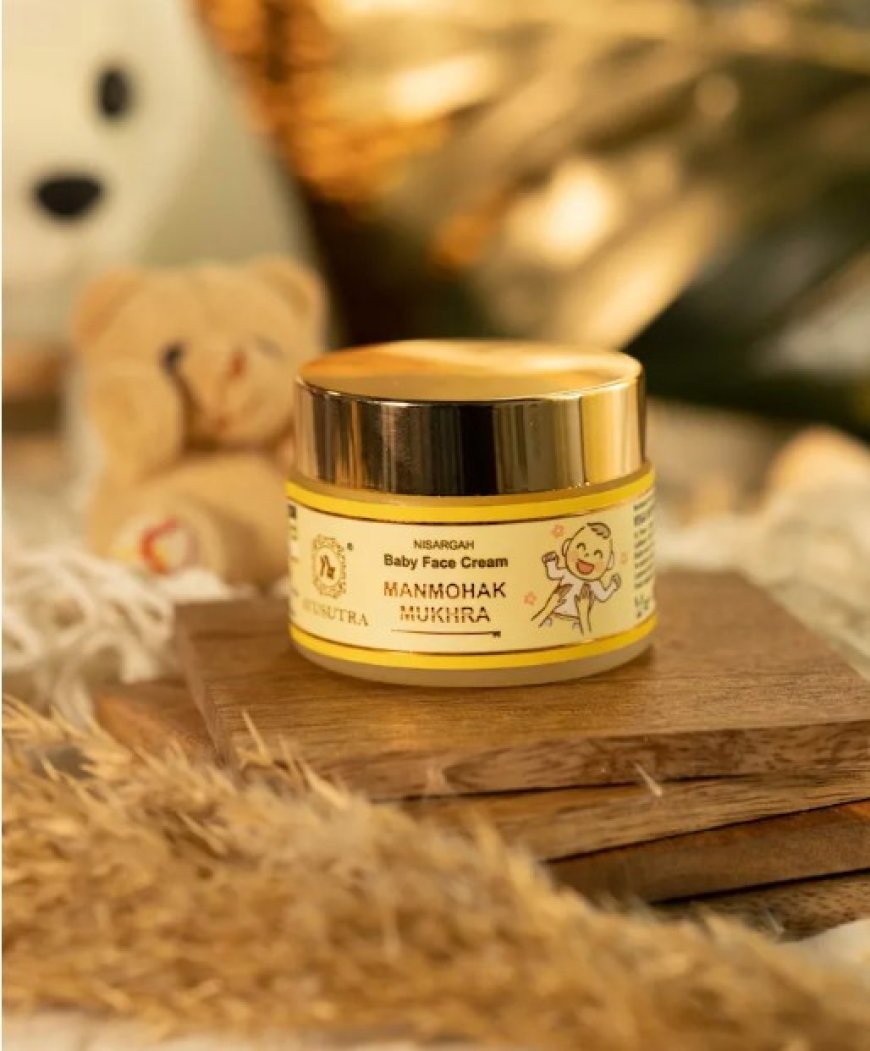Best Face Cream for Infants: How to Prevent Common Skin Issues
In this blog, we’ll explore how to choose the right face cream, common infant skin issues, and tips for a daily skincare routine to keep your baby’s skin in optimal condition.

Best Face Cream for Infants: How to Prevent Common Skin Issues
Safeguarding your child's sensitive skin is one of your main concerns as a parent. Because baby skin is thinner and more delicate than adult skin, it is more vulnerable to common skin conditions like irritation, rashes, and dryness.
Choosing the best face cream for infants can help you address and prevent these problems, ensuring your baby’s skin stays soft, smooth, and healthy. In this blog, we’ll explore how to choose the right face cream, common infant skin issues, and tips for a daily skincare routine to keep your baby’s skin in optimal condition.
Understanding Infant Skin: Why It Needs Special Care
Infant skin is vastly different from adult skin in terms of thickness, moisture retention, and sensitivity. Because their skin is thinner in newborns and babies, their skin barrier is still forming. It is, therefore, more susceptible to external elements like wind, sunlight, and cold air. This heightened sensitivity makes it easier for irritants to penetrate the skin, leading to dryness, redness, and rashes. Because of these unique characteristics, baby skin needs special care. Using a moisturising face cream specifically designed for infants helps maintain their skin’s natural barrier, locking in moisture and preventing dryness. Choosing a gentle, hypoallergenic, and fragrance-free product is essential, as harsh chemicals or artificial fragrances can easily irritate sensitive baby skin.
Common Skin Issues in Infants
Parents often notice certain skin issues arise within the first few months of their baby’s life. While most of these issues are normal and manageable, it’s essential to understand how to prevent them and how the right face cream can help.
1. Dry Skin
Dryness is one of the most common problems for infants, especially after bathing or in dry weather conditions. The baby’s skin loses moisture quickly, which can lead to rough patches and flakiness, particularly on the face. A high-quality moisturising cream can help seal in hydration and prevent the skin from becoming dry and irritated.
2. Facial Rashes
Babies are prone to rashes caused by drooling, exposure to harsh weather, or reactions to certain fabrics or products. Facial rashes can appear as small red bumps or patches of irritated skin. Using a face cream with soothing, natural ingredients can help calm irritated skin and provide a protective layer against further irritation.
3. Eczema
Eczema is a skin condition that affects many infants, causing dry, itchy patches that can become inflamed. Proper hydration is critical in managing eczema symptoms. A moisturising face cream formulated for sensitive skin can help alleviate discomfort and reduce flare-ups.
4. Irritation from External Factors
Exposure to sun, wind, or pollutants can easily irritate a baby’s sensitive skin. While it’s important to shield your baby from the elements, applying a protective layer of face cream can help act as a barrier between your baby’s skin and external irritants.
Key Ingredients to Look for in the Best Face Cream for Infants
When selecting a face cream for your baby, it’s crucial to pay attention to the ingredients. Here are some essential ingredients that can provide gentle care for your baby’s delicate skin:
1. Natural and Organic Oils
Ingredients like coconut oil, almond oil, and shea butter are rich in fatty acids and vitamins that provide deep hydration without irritating. These natural oils nourish the skin while locking in moisture, keeping your baby’s face soft and smooth.
2. Aloe Vera and Calendula
Both aloe vera and calendula are known for their soothing and healing properties. Aloe vera helps calm inflamed or irritated skin, while calendula reduces redness and promotes healing, making them ideal ingredients in infant face creams.
3. Fragrance-Free Formulas
Artificial fragrances can be harsh on a baby’s sensitive skin and often lead to allergic reactions or irritation. Opt for fragrance-free formulas that ensure your baby’s skin is protected from unnecessary irritants.
4. Hypoallergenic and Paraben-Free
Ensure the face cream is hypoallergenic, meaning it’s less likely to cause an allergic reaction. Also, avoid products with parabens, sulphates, and other harsh chemicals that could compromise your baby’s skin barrier.
Preventing Dryness and Irritation: Daily Care Routine Tips
Maintaining a consistent skincare routine for your baby is vital to keeping their skin healthy and preventing common issues like dryness or rashes. Here are some simple yet effective tips:
1. Regular Moisturising
After bathing your baby, gently pat their skin dry and apply a moisturising face cream while their skin is still slightly damp. This helps lock in moisture and prevents dryness throughout the day.
2. Choose the Right Product for Your Baby’s Skin Type
Whether your baby has dry, normal, or sensitive skin, it’s essential to choose a face cream that matches their specific needs. For sensitive or eczema-prone skin, opt for creams with extra moisturising and soothing properties.
3. Don't Wash Too Much
Your baby's skin may get dry from frequent bathing if its natural oils are removed. Once or twice a day, gently wash your baby's face with tepid water and a light soap. Always remember to moisturise afterwards.
4. Hydrate in All Seasons
While winter often causes dryness, even warm weather can dehydrate the skin. Regular moisturising ensures that your baby’s skin remains soft and nourished year-round.
Preventing Eczema and Rashes: How the Best Face Cream Can Help
A top-notch face cream not only hydrates your baby’s skin but also protects against common skin conditions like eczema and rashes. Here's how:
1. Moisture Barrier Protection
High-quality face creams create a protective moisture barrier on your baby’s skin, preventing environmental irritants from causing dryness or triggering eczema flare-ups.
2. Reducing Redness and Irritation
A cream formulated with anti-inflammatory ingredients like calendula or chamomile can significantly reduce redness and irritation, keeping your baby’s skin calm and soothed.
3. Nourishing Dry Patches
Consistent use of a good face cream helps heal and soften dry patches, reducing discomfort and preventing the development of rough, irritated skin.
Choosing the Best Face Cream for Infants: What Parents Should Consider
As you navigate the world of baby skincare, consider these factors when selecting a face cream for your infant:
1. Look for Paediatrician-Recommended Brands.
Trust paediatrician-recommended brands that specialise in infant skincare. These brands have undergone safety testing to ensure they are gentle enough for delicate baby skin.
2. Check for Certifications
Look for certifications such as "organic," "hypoallergenic," or "dermatologist-tested" to ensure the face cream meets high safety and quality standards.
3. Patch Test Before Use
Apply a little bit of the cream to your baby's inner arm as a patch test before using any new product on them. Prior to putting it to their face, give it a full day to make sure there is no negative reaction.
The Function of Organic and Natural Products in Baby Skincare
Natural and organic skincare products are increasingly popular among parents who want to avoid exposing their babies to harsh chemicals. Organic ingredients like plant-based oils, shea butter, and herbal extracts provide safe, gentle hydration and protection for your baby’s sensitive skin. Ayusutra’s range of organic baby skincare products offers parents peace of mind, knowing they are using products made from pure, natural ingredients.
Conclusion: Protect Your Baby’s Skin with the Right Face Cream
In conclusion, choosing the best face cream for infants is an essential part of preventing common skin issues such as dryness, rashes, and irritation. By selecting a high-quality, natural face cream that is gentle and hydrating, you can ensure your baby’s skin stays soft, healthy, and protected.
Remember, consistency is key—regularly moisturising your baby’s skin and following a gentle skincare routine will go a long way in maintaining their skin's natural beauty. Take the next step in caring for your baby’s delicate skin by exploring Ayusutra’s line of organic, natural skincare products designed specifically for infants. With the right products and a consistent routine, you can prevent common skin issues and ensure your baby’s skin stays soft, smooth, and healthy.
What's Your Reaction?


























